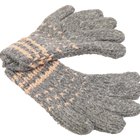Cotton clothing is traditionally considered cooling in warm climates, and old-school polyester, which repels moisture, has a reputation for being hot, sticky and uncomfortable. Meanwhile, modern polyester blends and high-tech wicking fabrics are touted as the best bets for warm-weather athletes. That said, cotton may be your best bet for everyday summertime wear.
Cotton Has the Advantage
In hot weather, the body keeps itself cool by sweating -- or perspiring, or glowing, if you'd prefer. Thin cotton clothing absorbs perspiration, while polyester repels it. Evaporation of the perspiration cools the body. So a cotton dress, shirt or underwear is often a better choice than polyester for everyday warm-weather wear. Thick, heavy cotton, however -- think of tents or outerwear -- won't let much moisture through, so it wouldn't be comfortable in hot weather.
Wicking Is Sometimes Better
Plenty of polyester blends are created specifically to keep athletes cool and comfortable. Workout clothing that "wicks" perspiration away from the body is designed to let more of your body's surface stay sweat-free so it can cool itself better. That's only in cases where you're really working up a sweat, though -- otherwise, cotton will likely keep you cooler.
"Performance-Improving"?
Some fabric blends are marketed with claims that they improve athletic performance or even regulate your body temperature. Before buying into such claims, Consumers Digest suggests investigating them -- many are more a fashion statement than anything else. The publication examined three T-shirts made of high-performance fabrics and found that they didn't cool the body any better than wearing no shirt at all. When Consumer Reports compared two "cooling towels" of high-tech blends with a regular towel, it found they all cooled about the same.
Related Articles

Nylon vs. Cotton Panties

How Does Thermal Underwear Work?

How Does Cotton Help Insulate?

Properties of Cotton Fabric

What Are Winter Jackets Made Of?

The Advantages of Wool Clothing

What Is a Thermal Shirt?

The Advantages & Disadvantages of ...

Differences Between Polyester and Nylon ...

What Is Fleece Fabric Made From?

How to Keep Bathwater Hot

How to Shrink Cotton

Microfiber vs. Cotton Clothes

What Is the Difference Between Lycra ...

Uses of Cotton Fabric

Winter Clothes Materials

Differences Between Under Armour ...

Thinsulate Vs. Thermolite

The Difference Between Polartec and ...

What Is the Warmest Lining for Winter ...
References
Writer Bio
Bonny Brown Jones has been a writer, columnist, copy editor and senior copy editor for newspapers that have included the "Orlando Sentinel," "Miami Herald" and "Columbus (Ohio) Dispatch." Jones has a Bachelor of Arts in English from Ohio State University.